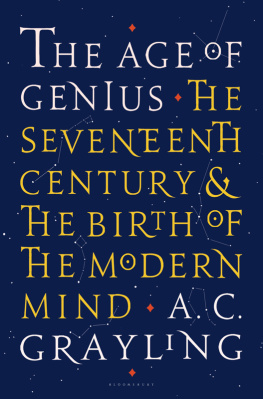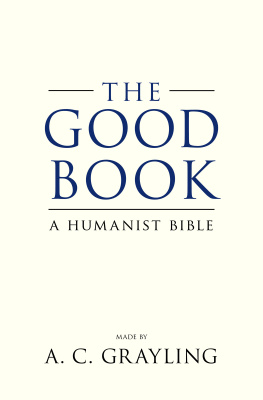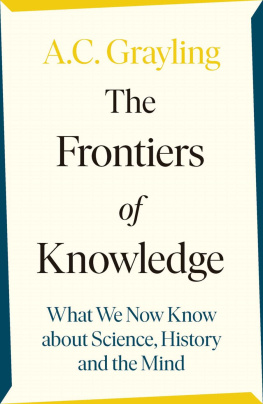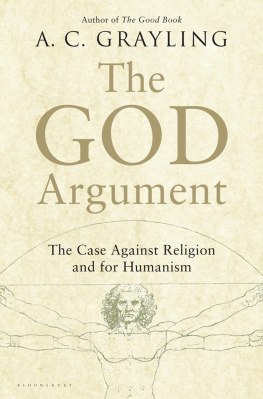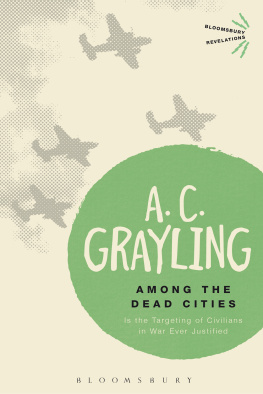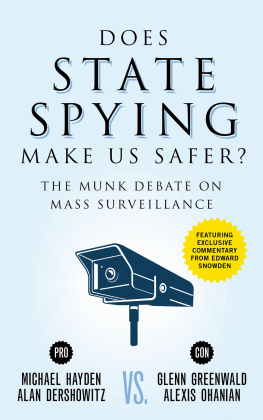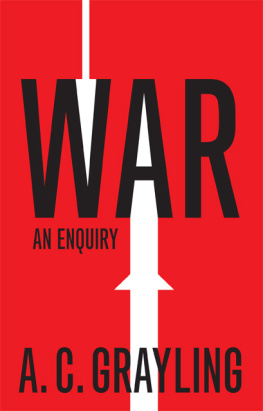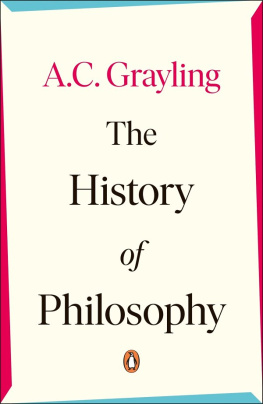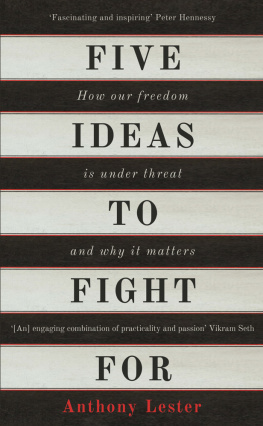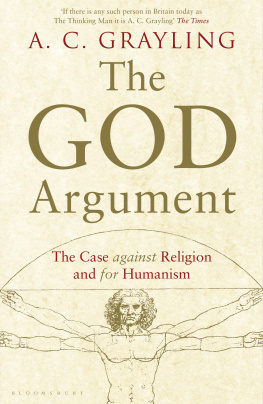Acknowledgements
Some of the material in what follows first appeared and mainly in earlier draft form in various newspapers and magazines, including the Guardian , The Times , Index and the Independent , and in Prospect magazine. I am grateful to the various editors of these journals for the opportunity to express and develop these views in their columns. The rest of the material is new. A significant part of the background to the arguments here is provided by my account of the development of conceptions of liberty in particular, and civil liberties and human rights in general, in Towards the Light (Bloomsbury, 2007 ). The historical background there, and the contemporary arguments here, form a whole. Somewhat more indirectly I would include the even longer historical story about ideas of the good in the Western tradition in my What Is Good? (Weidenfeld, 2001 ) for its close relevance to the more immediate arguments of the present book and its 2007 fellow.
I wish to thank Anthony Barnett, Jonathan Cooper, Helena Kennedy, Maya Lester, Henry Porter, Lizzie Rogers and Bill Swainson for various and valuable helps during the work that went into this book.


Appendix
Laws and measures that have reduced civil liberties in the United Kingdom and the United States in recent years.
A principal but by no means exclusive driver of reductions on liberties in the UK since 1997 has been the raft of antiterrorism and associated legislation introduced by the Labour Government:
Terrorism Act 2000 Anti-Terrorism, Crime and Security Act 2001 The Civil Contingencies Act 2004 Prevention of Terrorism Act 2005 Terrorism Act 2006 Identity Cards Act 2006 Counter-Terrorism Act 2008
Other measures that have contributed to the same liberty-diminishing effect include:
Crime and Disorder Act 1998
Criminal Justice (Terrorism and Conspiracy) Act 1998
Regulation of Investigatory Powers Act 2000
Criminal Justice and Police Act 2001
Nationality Immigration and Asylum Act 2002
Anti-Social Behavour Act 2003
Criminal Justice Act 2003
Children Act 2004
Serious Organised Crime and Police Act 2005
Regulation of Investigatory Powers (Communications and Data) (Additional Functions and Amendment) Order 2006
UK Borders Act 2007
Tribunals Courts and Enforcement Act 2007
Note that these measures follow more than two decades of legislation for counter-terrorism measures, most of it up to the Terrorism Act 2000 claiming, on first introduction, to be temporary and designed only to provide the security services and courts with capacity to deal with IRA terrorism while the threat lasted. In fact many of the provisions in these measures remain in force, sometimes incorporated into new legislation to give it permanent effect.
The Human Rights Act 1998 (HRA) might be thought a counter to the threat to civil liberties in these instruments, but alas it is a measure of equivocal value because practically every right stated in the Act carries a second clause providing for derogation from it. For example, its important Article protecting privacy is rendered nugatory by the attached derogation, which removes all protection from most of the surveillance powers acquired by government and the security services since the HRA came into force. And the courts have no power to strike down legislation incompatible with the HRA; they can only make a declaration of incompatibility and require the government to review the matter.
The way that attempts to apply the HRA to protect civil liberties in the face of the onslaught of liberty-reducing laws have backfired is illustrated by the following. In 2004 the House of Lords ruled (in A and Others ) that the Anti-Terrorism Crime and Security Act of 2001 violated human rights by licensing indefinite detention of terrorism suspects, and by discriminating against such suspects on grounds of their nationality and immigration status. The government responded by introducing Control Orders in the Prevention of Terrorism Act 2005 which had the effect of extending powers of detention considerably.
The powers assumed by the government and security services under the measures listed above are as follows:
The Terrorism Act 2000 broadens the definition of terrorism to cover domestic acts and motivations of religious, political or ideological kinds, and creates a new offence of incitement to terrorism. It gives police extended stop and search powers, and extends the period of detention before charge to seven days. A number of organisations were outlawed as terrorist organisations (including Al-Qaeda; this, note, was before / ).
The Regulation of Investigatory Powers Act 2000 was the first step in extending already existing powers of surveillance relating to covert operations to watch individuals and collect information about them secretly, including taking photographs and video footage, eavesdropping on communications, entering private premises, following, and opening mail. It gives the government powers to oblige internet service providers to fit equipment to enable surveillance of internet users. This Act and the subsequent Regulation of Investigatory Powers (Communications and Data) (Additional Functions and Amendment) Order 2006 note the nature of this instrument bring an end to private communication; all private communication in any form is now open to inspection by government and the security services at their discretion.
The Anti-Terrorism, Crime and Security Act 2001 enabled
the government to freeze assets of terrorism suspects and gave the Home Secretary powers to detain indefinitely and without charge any foreign national suspected of terrorism. This as noted above was challenged by the House of Lords and has now been replaced by the use of Control Orders. The Act also requires airlines to provide the authorities with information about passengers, banks to inform the authorities of anything suspicious in their customers activities, and general retention by service providers, for lengthy periods, of their communications data.
The Criminal Justice Act 2003 increased the length of pre-charge detention of suspects from seven to fourteen days.
The Children Act 2004 , which came into effect in January 2008 , collects and pools information about all children living in England. The information is available to officials but not to parents. It is the starting point for a totalising cache of information on every citizen which will be complete and exhaustive once it is combined with identity card data for adults and collated onto the National identity Register.
The Civil Contingencies Act 2004 provides that in a situation deemed to be an emergency, any senior minister can issue emergency regulations by Order in Council to protect life, communications, and supplies of money, fuel, water and food. It empowers confiscation of property without compensation, enforced movement of people from one location to another, prohibition of any such movement or travel, enforced labour of citizens, deployment of armed forces, the stipulation of new offences, and the setting up of new courts and tribunals.
The Prevention of Terrorism Act 2005 introduced the aforementioned Control Orders to enable the authorities to restrict the movements and activities of people suspected of involvement, in some way, in terrorism, while lacking sufficient evidence to charge them.
The Serious Organised Crime and Police Act 2005 forbids demonstrations within one kilometre of Parliament without police permission. The police can also dictate how many people can take part, and the type of banners (thus: what they say) that can be used.
Next page

